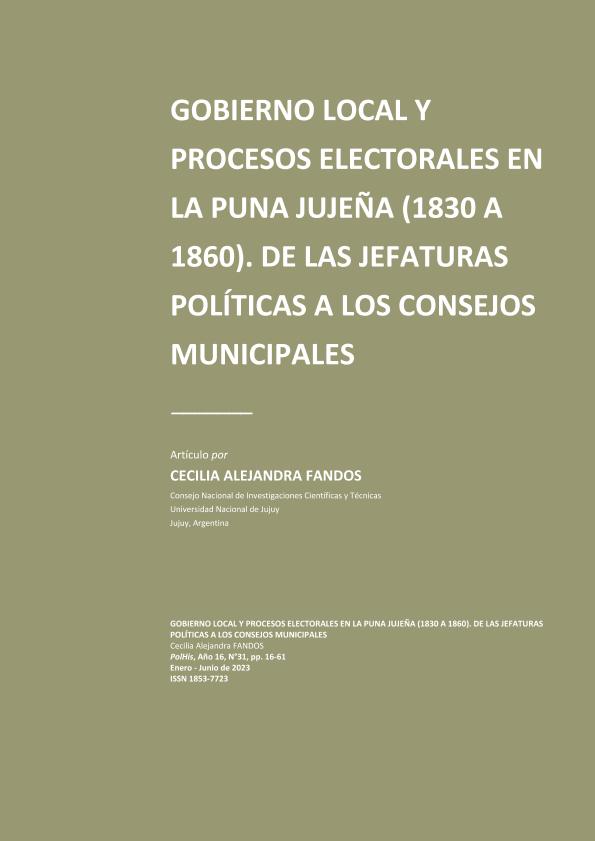Mostrar el registro sencillo del ítem
dc.contributor.author
Fandos, Cecilia Alejandra

dc.date.available
2024-03-13T11:01:15Z
dc.date.issued
2023-09
dc.identifier.citation
Fandos, Cecilia Alejandra; Gobierno local en la puna Jujeña (1830 a 1860): De las jefaturas políticas a los consejos municipales; Universidad Nacional de Mar del Plata. Facultad de Humanidades; PolHis; 31; 9-2023; 16-61
dc.identifier.issn
1853-7723
dc.identifier.uri
http://hdl.handle.net/11336/230272
dc.description.abstract
Un estudio clásico de Guillermo Madrazo sobre la historia de los “ambientesandinos” del actual territorio argentino, asegura que las sociedadesindígenas de esos espacios se desarticularon a partir de la Revolución por laIndependencia y durante el siglo XIX, lo cual provocó una situación demarginalidad y desubicación de esos sujetos en el nuevo sistema políticoemergente. En esta propuesta, revisamos estas antiguas premisas a partir derevelar indicadores de la praxis política en la puna de Jujuy y el desempeñocotidiano y situado de las autoridades republicanas en esa región. Unamirada exhaustiva del proceso de instalación institucional del estadorepublicano en la Puna, desde la década de 1830 hasta 1860, puedebrindarnos herramientas empíricas para comenzar a componer el procesode constitución del poder local y de configuración de la cultura políticadesde las bases de esas sociedades, mayoritariamente de raigambreindígena.
dc.description.abstract
Guillermo Madrazo, in his study about the history of the “Andean environments” from the actual Argentinian territory, has ensured that those areas indigenous societies have been disarticulated since the Revolution of Independence and during the 19th century. The author states that this process has provoked a situation of marginality and misplacement of those subjects in the new political emergent system. In this article, we review these antique premises by revealing indicators of the political praxis in the Jujuy plateau and the regular and situated performance of the republican authorities from that region. An exhaustive look at the process of the institutional installation of the republican estate in “La Puna” (from the 1830s until the 1860s) offers empirical tools to start composing the process of constitution of the local power and configuration of the political culture from the bases of those societies, mainly indigenous roots.
dc.format
application/pdf
dc.language.iso
spa
dc.publisher
Universidad Nacional de Mar del Plata. Facultad de Humanidades
dc.rights
info:eu-repo/semantics/openAccess
dc.rights.uri
https://creativecommons.org/licenses/by-nc/2.5/ar/
dc.subject
CIUDADANÍA INDIGENAS
dc.subject
CULTURA POLITICA
dc.subject
REVOLUCIÓN TERRITORIAL
dc.subject
SIGLO XIX
dc.subject.classification
Otras Humanidades

dc.subject.classification
Otras Humanidades

dc.subject.classification
HUMANIDADES

dc.title
Gobierno local en la puna Jujeña (1830 a 1860): De las jefaturas políticas a los consejos municipales
dc.type
info:eu-repo/semantics/article
dc.type
info:ar-repo/semantics/artículo
dc.type
info:eu-repo/semantics/publishedVersion
dc.date.updated
2024-03-12T10:57:53Z
dc.journal.number
31
dc.journal.pagination
16-61
dc.journal.pais
Argentina

dc.journal.ciudad
Mar del Plata
dc.description.fil
Fil: Fandos, Cecilia Alejandra. Universidad Nacional de Jujuy. Centro Interdisciplinario de Investigaciones En Tecnologias y Desarrollo Social Para El Noa. - Consejo Nacional de Investigaciones Cientificas y Tecnicas. Centro Cientifico Tecnologico Conicet - Saltajujuy. Centro Interdisciplinario de Investigaciones En Tecnologias y Desarrollo Social Para El Noa.; Argentina
dc.journal.title
PolHis
dc.relation.alternativeid
info:eu-repo/semantics/altIdentifier/url/https://polhis.com.ar/index.php/polhis/article/view/443
Archivos asociados
